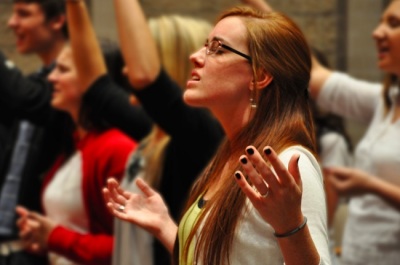Missions Expert: Churches Must 'Keep Christianity Weird,' Embrace Eccentricity

If the Church wants to grow, it must celebrate those who take eccentric actions to spread the faith, says Michael Frost in his new book about Church "rule-breaker" movements.
In Keep Christianity Weird: Embracing the Discipline of Being Different, Frost, co-founder of Forge Mission Training Network, calls on pastors to use unconventional methods in their ministry to foster "greater creativity and innovation."
"Could it be that the church has closed its doors to the misfits and rebels and troublemakers? Does the church make space for and foster the contributions of those who see things differently?" asks Frost in the first chapter of his book.
"... the broader culture increasingly recognizes the contribution of eccentricity to the greater good. But not the church. Just as business and education is fostering greater creativity and innovation, the church is in a phase of rewarding compliance and conservatism and suppressing eccentricity."
Frost, who's an expert on international church missions, cites multiple examples of groups within Christianity that exhibit the healthy eccentricity he supports, including the Cistercians, Anabaptists and Pentecostals.
"All the great Christian rule-breakers of history submitted themselves to rigorous instruction and discipline as part of their journey into eccentricity," wrote Frost.
Below is an edited transcript of The Christian Post's interview with Frost about his book, Keep Christianity Weird.
CP: You say in Chapter 1 that the Church suppresses eccentric creativity. In what specific ways do you believe institutional churches do this?
Frost: All institutions do this, not just the church. In an attempt to maintain cohesion, they require a level of conformity by their members. To maintain this, they marginalize anyone who questions the status quo. It takes a concerted effort by an institution to encourage innovation and creativity.

Churches can then add a "spiritualized" dimension to it, by labeling these eccentrics as disloyal or claiming they are fostering disunity. In some churches, to even question the leadership is tantamount to attacking God's anointed ones.
I think we need leaders who can tell the difference between fractious troublemakers and those who are clearly discerning the Spirit of God, calling the church to rediscover its vision as a genuinely alternative society.
CP: Do you believe there are churches in the modern day that do not suppress eccentric behavior or creativity? If so, which ones? Does it vary from denomination to denomination?
Frost: Some church planting movements value creativity and innovation. Not the franchise model in the U.S., but the rapid multiplication movements we see in Africa and Asia. That being said, I don't think you could say any one denomination suppresses eccentricity less than the others. It varies from church to church, not denomination to denomination.
I mention that several "eccentric" movements have occurred in the church down through history — the Celts, the Cistercians, the Anabaptists and the Pentecostals. They are quite different in terms of ecclesiology and, in some ways, theology. But what they had in common was a radical resolve to obey God even if that meant sticking out like a sore thumb.
CP: In Chapter 3, you explain how Jesus was a "weirdo" and give examples from the Gospel. What other example(s), aside from the ones explained in the chapter, would you give as proof that Jesus was eccentric?
Frost: He questioned the status quo, relentlessly. He accused the religious leadership of Israel of locking the people up in filthy sheep pens and preying on their worst fears, and declared he had come to throw open the gate and lead the people to freedom, instead of teaching in the traditional fashion of commentating laboriously on the Hebrew Scriptures.
He popularized His message by using quaint agrarian stories drawn from the everyday. He ate with Roman collaborators, tax collectors, and those referred to as "sinners." He taught people how to shame the Romans by turning the other cheek or carrying their pack an extra mile.
I could go on and on. Jesus was completely off center, a square peg in a round hole. And those who were most attracted to Him were the ones who had nothing to lose — women, children, young fishermen, the poor, the disabled. With this band of misfits and outcasts, he changed the entire world.
CP: You document several movements within Christianity over the centuries that had this healthy eccentric weirdness, only to eventually fall into conformity. Is the failure of "weird Christianity" an inevitability? Or is there a way to make a lasting positive impact?
Frost: No, like all fresh movements, they eventually concretize the very thing that made them fresh in the first place. They turn their charism (or gift) into an institutional distinctive and demand conformity to it. That's the way of institutions. We shouldn't bemoan that fact. However, the spirit of fresh, vital, weird Christianity emerges again and again throughout the Church. That's where the lasting impact is.
The Church keeps finding its weird, sometimes in the most unlikely ways. It's OK that the Cistercians drifted into legalism, or that the Pentecostals became more socially acceptable. These movements burst to life, shifted the Church back to its center, and eventually ran out of steam. We just need to continue to encourage fresh new movements of the spirit.
I read once that when NASA was sending spacecraft to the moon, those rockets didn't have their jets burning the whole way. They took off in the direction of the moon and then the engines shut off, allowing the ship to drift toward the destination. Inevitably though, they drifted slightly off target. When that happened the thrusters would light up and surge the ship back in the direction of the moon. These thrusts occurred regularly, reorienting the rocket to its destination.
I think renewal movements do that for the Church. These weird movements are like thrusters, pushing the Church back where God wants it. And I think we could do with a big thrust right now at this point in history.
CP: Would you say your book is more for those who are eccentric or for those in positions of power in the Church who need to be more aware of the benefits of keeping Christianity weird?
Frost: Definitely the latter. The word "eccentric" comes from a combination of the Greek terms ek (out of) and kentron (center). When put together, ekkentros means "out of center." A more colloquial expression would be "off center." And when you think about it, anyone who has displaced their own ego at the center of their being and put God there as the center and focus of their lives can rightly be called eccentric. Church leaders need to help all Christians to recover this off-center way of living out their faith in the eccentric way of Jesus.




























